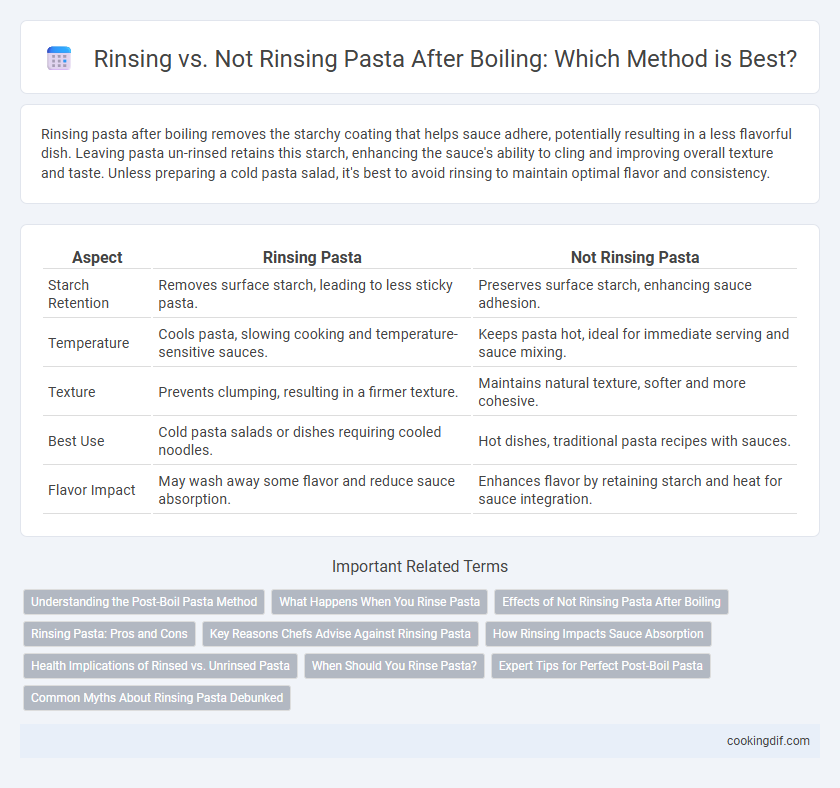Rinsing pasta after boiling removes the starchy coating that helps sauce adhere, potentially resulting in a less flavorful dish. Leaving pasta un-rinsed retains this starch, enhancing the sauce's ability to cling and improving overall texture and taste. Unless preparing a cold pasta salad, it's best to avoid rinsing to maintain optimal flavor and consistency.
Table of Comparison
| Aspect | Rinsing Pasta | Not Rinsing Pasta |
|---|---|---|
| Starch Retention | Removes surface starch, leading to less sticky pasta. | Preserves surface starch, enhancing sauce adhesion. |
| Temperature | Cools pasta, slowing cooking and temperature-sensitive sauces. | Keeps pasta hot, ideal for immediate serving and sauce mixing. |
| Texture | Prevents clumping, resulting in a firmer texture. | Maintains natural texture, softer and more cohesive. |
| Best Use | Cold pasta salads or dishes requiring cooled noodles. | Hot dishes, traditional pasta recipes with sauces. |
| Flavor Impact | May wash away some flavor and reduce sauce absorption. | Enhances flavor by retaining starch and heat for sauce integration. |
Understanding the Post-Boil Pasta Method
Rinsing pasta after boiling removes surface starch, which can prevent sauce from adhering properly, reducing flavor absorption and texture quality. For the post-boil method, it's optimal to avoid rinsing to maintain the pasta's natural stickiness, ensuring a more cohesive dish. Retaining the residual starch also helps the sauce emulsify, enhancing both taste and mouthfeel.
What Happens When You Rinse Pasta
Rinsing pasta after boiling removes the starch that helps sauce adhere, resulting in a less flavorful dish and a slippery texture. It also cools the pasta quickly, which is useful for cold pasta salads but undesirable for hot dishes where warmth and sauce absorption are preferred. Avoiding rinsing preserves the pasta's natural starch layer, enhancing sauce cling and boosting the overall taste and mouthfeel.
Effects of Not Rinsing Pasta After Boiling
Not rinsing pasta after boiling preserves the surface starches essential for thickening sauces and enhancing flavor adhesion. The natural starch residue promotes a better sauce grip, resulting in a more cohesive and flavorful dish. Avoiding rinsing also maintains the pasta's optimal texture and temperature, ensuring a superior eating experience.
Rinsing Pasta: Pros and Cons
Rinsing pasta after boiling removes excess starch, preventing clumping and creating a less sticky texture ideal for cold dishes like pasta salads. However, rinsing also washes away flavorful surface starch that helps sauces adhere better, potentially resulting in a less cohesive dish. For hot pasta recipes, skipping the rinse retains starch to enhance sauce absorption and improve overall taste and texture.
Key Reasons Chefs Advise Against Rinsing Pasta
Rinsing pasta removes the surface starch that helps sauce adhere, leading to a less flavorful dish with a compromised texture. Chefs emphasize that rinsing cools the pasta, interrupting the cooking process and resulting in uneven doneness. Preserving the natural starch on the pasta ensures optimal sauce absorption and a cohesive final dish, which is why professional kitchens avoid rinsing.
How Rinsing Impacts Sauce Absorption
Rinsing pasta after boiling removes the starch that helps sauces cling to the noodles, resulting in less flavorful dishes. When pasta is not rinsed, the natural starches create a slightly sticky surface that enhances sauce adhesion and improves overall taste. Therefore, skipping the rinse ensures better sauce absorption and a more cohesive pasta dish.
Health Implications of Rinsed vs. Unrinsed Pasta
Rinsing pasta after boiling removes surface starches, which can reduce the glycemic index and decrease the risk of blood sugar spikes, beneficial for individuals managing diabetes. However, rinsing also washes away essential nutrients such as B vitamins and minerals, potentially diminishing the pasta's nutritional value. Unrinsed pasta retains these nutrients and the natural starches that help sauce adhesion, but may have a higher glycemic response and slightly stickier texture.
When Should You Rinse Pasta?
Rinsing pasta after boiling is recommended when preparing cold dishes like pasta salads to prevent the noodles from sticking and to cool them quickly. For hot pasta dishes, avoid rinsing to preserve the starches that help sauce adhere, ensuring better texture and flavor absorption. In professional kitchens, rinsing is also done when reheating pasta to prevent overcooking or clumping in buffet settings.
Expert Tips for Perfect Post-Boil Pasta
Rinsing pasta after boiling removes the natural starch that helps sauces adhere, so experts recommend avoiding rinsing for a richer, more flavorful dish. Leaving pasta un-rinsed retains its texture and enhances sauce absorption, creating a perfectly balanced bite. For dishes like pasta salads, rinsing is advised to cool the pasta and prevent clumping, but for traditional hot dishes, embracing the natural starch is key to culinary success.
Common Myths About Rinsing Pasta Debunked
Rinsing pasta after boiling removes the starch that helps sauce adhere, which can lead to a less flavorful dish. Many believe rinsing cools pasta and stops cooking, but this also washes away flavor and texture essential for traditional recipes. The best practice is to avoid rinsing unless making a cold pasta salad or when a sticky texture is undesirable.
Rinsing pasta vs not rinsing pasta for post-boil method Infographic

 cookingdif.com
cookingdif.com